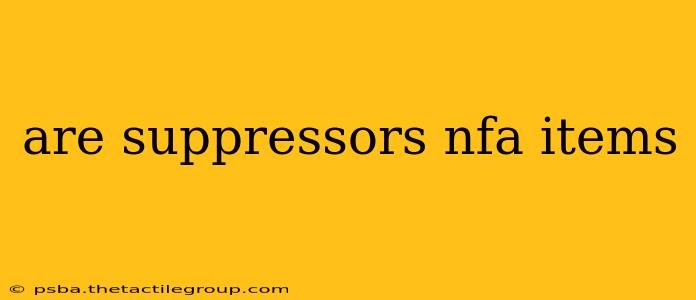Yes, suppressors, also known as silencers, are definitively classified as National Firearms Act (NFA) items in the United States. This means their ownership, manufacture, and transfer are heavily regulated under federal law. Understanding these regulations is crucial for anyone considering owning a suppressor. This guide will break down the key aspects of NFA regulations concerning suppressors.
What is the National Firearms Act (NFA)?
The NFA, enacted in 1934, regulates certain types of firearms and firearm accessories deemed particularly dangerous or associated with criminal activity. This legislation aims to control the proliferation of these items and enhance public safety. Key NFA-regulated items include:
- Machine guns: Fully automatic firearms capable of firing multiple rounds with a single trigger pull.
- Short-barreled rifles (SBRs): Rifles with barrels shorter than 16 inches.
- Short-barreled shotguns (SBSs): Shotguns with barrels shorter than 18 inches.
- Destructive devices: This category encompasses items like bombs, grenades, and certain types of firearms designed to inflict significant damage. Crucially, suppressors fall under this category.
- Any other weapon: This is a broad category encompassing items not easily classified elsewhere but possessing destructive potential.
Why are Suppressors Regulated Under the NFA?
The rationale behind classifying suppressors as NFA items stems from their potential to reduce the sound of gunfire. While not rendering firearms silent, suppressors significantly mitigate the noise, potentially making illegal activities more difficult to detect and increasing the risk of their use in crimes. The NFA aims to restrict access to these devices to prevent their misuse.
The Process of Obtaining a Suppressor: Navigating the NFA Maze
Acquiring a suppressor involves a more stringent process than purchasing a standard firearm. Here’s a summary of the steps involved:
1. Application and Tax Stamp:
The cornerstone of legal suppressor ownership is the submission of ATF Form 4, the application for tax-paid firearm. This application requires detailed personal information, fingerprints, and photographs. A $200 tax is also payable to the Bureau of Alcohol, Tobacco, Firearms and Explosives (ATF).
2. Background Check:
The ATF conducts a thorough background check, similar to the process for purchasing a standard firearm, but significantly more extensive due to the NFA's strict regulations. This involves checking for any criminal history or other disqualifying factors.
3. Waiting Period:
There is a significant waiting period while the ATF processes your application. The timeframe can vary, but it typically takes several months or even longer.
4. Approval and Possession:
Once the ATF approves your application, you will receive your tax stamp. Only then can you legally take possession of the suppressor.
Understanding the Legal Ramifications
It’s crucial to fully comprehend the legal implications of owning a suppressor. Failure to comply with NFA regulations can lead to severe penalties, including hefty fines and imprisonment. Always ensure you're adhering to all applicable federal, state, and local laws. Consult with a legal professional specializing in firearms law if you have any doubts or questions.
Conclusion: Responsible Suppressor Ownership
Suppressors are powerful tools with legitimate uses, but their ownership is subject to strict regulations under the NFA. Understanding these regulations, completing the necessary paperwork accurately, and adhering to all applicable laws are paramount for responsible and legal suppressor ownership. This comprehensive guide provides a starting point for your research, but consulting with legal counsel and staying updated on current regulations remains vital.

